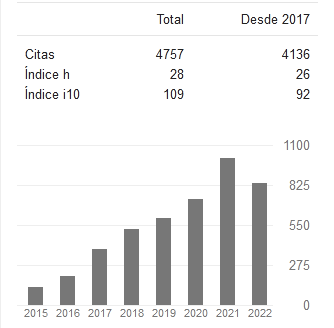COMUNICACIÓN INTELIGENTE PARA CIUDADES INTELIGENTES. ESTUDIO DE CASO: LA PÁGINA WEB DE LA MUNICIPALIDAD DE GENOVA
Palabras clave:
smart city; indicadores; gestión de gobierno; competencias digitales; accesibilidad web; comunicación integrada.Resumen
La contribución pretende ser una propuesta práctica que forma parte del debate sobre la transformación urbana hacia el concepto de ciudad smart city y quiere dar un ejemplo en la interpretación de las variables clave que afectan y que rodean la prestación de la administración pública con los ciudadanos y las empresas el territorio. La contribución del estudio contribuye al debate internacional en relación con el tema y las herramientas utilizadas hasta la fecha, muestra el interés de las funciones de comunicación de la web como el tamaño de una comunicación inteligente en consonancia con los temas y las competencias digitales de los ecosistemas que componen la ciudad inteligente. El análisis de los indicadores y la literatura europea del tema, y la comparación de los sitios web de las ciudades que promueven modelos de transformación inteligente en el plano internacional y nacional nos ha permitido proponer un modelo de comunicación integral que crea la reunión deseada "entre el "hombre digital y hombre social" se traducen en funciones tradicionales inteligentes de la página web corporativa de Génova. Con el fin de contribuir a la literatura internacional sobre el tema, los estudios futuros mostrarán el grado de facilidad de uso de las herramientas de comunicación integradas propuestas destacando la importancia de las actitudes y comportamientos de los ciudadanos relacionadas con la percepción y el valor real de este modelo inteligente.
Descargas
Citas
Allwinkle, S. and Cruickshank, P. 2011. Creating smart-er cities: an overview, Journal of urban technology, 18, 2, (April 2011), 1-16. DOI= http://10.1080/10630732.2011.601103
Caragliu, A., C. del Bo, and P. Nijkamp. Smart Cities in Europe. in 3rd Central European Conference in Regional Science - CERS. 2009.6.
Esty, DC., Levy, MA., Kim, CH., de Sherbinin, A., Srebotnjak, T., and Mara, V. 2008. 2008 Environmental Performance Index. New Haven: Yale Center for Environmental Law and Policy.
ETSI TS 103 199. Environmental Engineering (EE); Life Cycle Assessment (LCA) of ICT equipment, network and services; General methodology and common requirements. Technical specification, V1.1.1 (2011).
European Commission. 2012. ICT for Sustainable Growth, http://ec.europa.eu/information_society/activities/sustainable_growth/index_en.htm
Giffinger, R., Fertner, C., Kramar, H., Kalasek, R., Pichler- Milanovic, N., and Meijers, E. 2007. Smart cities, ranking of European medium-sized cities, Final report from Centre of Regional Science, Vienna UT, October 2007.
Global city indicators. 2007. Themes, http://www.cityindicators.org/
Hilty, L., Lohmann, W., and Huang, E. 2011. Sustainability and ICT - An overview of the field with focus on socio- economic aspects. Notizie di Politeia, 17, 104, 13-28. DOI= http://dx.doi.org/10.5167/uzh-55640
Hollands, RG. 2008. Will the real smart city please stand up? City. 12, 3, (December 2008), 303-320. DOI= http://10.1080/13604810802479126
ICF. Intelligent Community Forum web page. 2012 [cited 2012 25]; Available from: http://www.intelligentcommunity.org/
International Institute of Sustainable development. 2012. Compendium - a global directory to indicator initiatives, http://www.iisd.org/measure/compendium
Manville, C., Cochrane, G., Cave, J., Millard, J., Pederson, J. K., Thaarup, R. K., Liebe, A., Wissner, M., Massink, R., Kotterink, B. 2014. Mapping Smart Cities in the EU, Directorate General for internal policies: Economic and Scientific Policy. Available at: http://www.europarl.europa.eu/RegData/etudes/etudes/join/2014/507480/IPOL-ITRE_ET(2014)507480_EN.pdf
Nam, T., and Pardo, TA. 2011. Conceptualizing Smart City with Dimensions of Technology, People, and Institutions, The proceedings of the 12th Annual International conference on digital government research, Maryland USA, June 12-15, 2011.
TU-T L1420, Methodology for energy consumption and greenhouse gas emissions impact assessment of information and communication technologies in organizations ,International Telecommunication Union. Telecommunication Standardization sector. (2012).
United Nations (2012). The future we want Cities, fact sheet for the Rio +20 United National Conference on Sustainable Development, Rio de Janeiro, Brazil, June 20-22, 2012. Accessible at http://www.un.org/en/sustainablefuture/pdf/Rio+20_FS_Cities.pdf
Walton JS., El-Haram M., Castillo NH., Horner RMW., Price ADF., and Hardcastle C. 2005. Integrated assessment of urban sustainability, Engineering Sustainability, 158, 2, (June 2005), 57-65. DOI= http://10.1680/ensu.2005.158.2.5
Washburn, D., Sindhu, U.,, Helping CIOs Understand "Smart City" Initiatives, 2010, Forrester
Watson, J. (editor). 2009. European Green City index – assessing the environmental performance of Europe’s major cities, a research project conducted by the Economist Intelligence Unit, sponsored by Siemens. Munich Germany 2009.
Webb, M., Finighan, R., Buscher, V., Doody, L., Cosgrave, E., Giles, S., Hawes-Hewitt, J., Walt, N., Mulligan C., et al. 2011.Information marketplaces, the new economics of cities. Report from The Climate Group, Arup, Accenture and Horizon, University of Nottingham. http://www.theclimategroup.org/what-we-do/publications/Information-Marketplaces-The-New-Economics-of-Cities/
Descargas
Publicado
Cómo citar
Número
Sección
Licencia
Derechos de autor 2020 Diego Calandrino

Esta obra está bajo una licencia internacional Creative Commons Atribución 4.0.
Usted es libre de:
- Compartir — copiar y redistribuir el material en cualquier medio o formato
- Adaptar — remezclar, transformar y construir a partir del material para cualquier propósito, incluso comercialmente.
Bajo los siguientes términos:
- Atribución — Usted debe dar crédito de manera adecuada, brindar un enlace a la licencia, e indicar si se han realizado cambios. Puede hacerlo en cualquier forma razonable, pero no de forma tal que sugiera que usted o su uso tienen el apoyo de la licenciante.
- No hay restricciones adicionales — No puede aplicar términos legales ni medidas tecnológicas que restrinjan legalmente a otras a hacer cualquier uso permitido por la licencia.













































